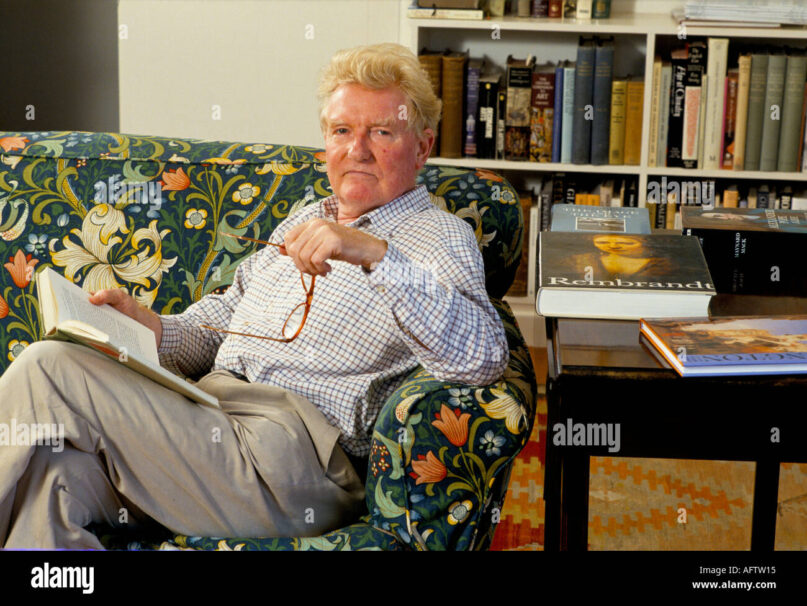“Rabbi, can you recommend a good book on Jewish history?”
Believe it or not — even with the plethora of books on that weighty subject, I am hard pressed to recommend a book on that subject for a smart lay person.
I am talking about a good, readable, general book on Jewish history.
Which makes me mourn the late writer, Paul Johnson, even more than most deaths.
Johnson, who died last week at the age of 94, was a prolific journalist, anthologist, speechwriter, and a popular historian. His histories were on such huge subjects as Christianity, England, the United States, modern history, and art, not to mention numerous biographies.
And, Judaism.
Johnson was not a Jew, but he wrote the book that is, IMHO, the most accessible and readable general history of the Jews – A History of the Jews.
The best part of the book might be its epilogue.
Johnson asks the question: What would have happened had Abraham simply stayed in Ur, and not moved towards the creation of a new people, and ultimately, a new religious culture?
His words:
Certainly the world without the Jews would have been a radically different place. Humanity might eventually have stumbled upon all the Jewish insights. But we cannot be sure. All the great conceptual discoveries of the intellect seem obvious and inescapable once they have been revealed, but it requires a special genius to formulate them for the first time.
Johnson was saying: While we might have hoped that someone would have simply figured out Judaism’s essential insights, it did not work out that way. These insights were not the sort of thing that you could sit around and just invent, or come to by virtue of your reason. Judaism is not mathematics. It is a complex religious and cultural system, and it needed Jews to create it.
But then, there is the final paragraph of the book:
The Jews believed themselves created and commanded to be a light to the gentiles and they have obeyed to the best of their considerable powers. The results, whether considered in religious or in secular terms, have been remarkable. The Jews gave to the world ethical monotheism, which might be described as the application of reason to divinity. In a more secular age, they applied the principles of rationality to the whole range of human activities, often in advance of the rest of mankind. The light they thus shed disturbed as well as illuminated, for it revealed painful truths about the human spirit as well as the means to uplift it. The Jews have been great truth-tellers, and that is one reason they have been so much hated.
Whenever I think of antisemitism, that paragraph comes back to me.
For many years, I have suspected that antisemitism comes from the suspicion that “there’s something about the Jews.”
But, what is it?
That question haunted one of the most prolific, and one of the most controversial, thinkers in the contemporary world – the late George Steiner, literary critic, professor of comparative literature at Oxford and Cambridge, and one of the more original intellectuals in the contemporary cultural landscape.
According to Steiner, the role of the Jews is — here goes — to be a royal pain in the you-know-what.
The Jews invented monotheism — the idea of a single god Who had ethical standards, and Who was demanding and, yes, judgemental.
That is how the Jews became a “moral irritant and insomniac among men,” a role Steiner calls an “honor beyond honors.” The Jew represents the uncompromising demand for universal morality, the intoxicating idea that human beings can overcome their selfish impulses.
But this came with a price — Jew-hatred and Judaism-hatred. There is that wonderful rabbinic pun: Sinai, the moment of revelation) led to sinah, hatred.
Jew-hatred, therefore, is an exalted version of “kill the umpire!” Or, at the very least, the urge to silence your alarm clock.
No one likes their wake up call.
Many years ago, I encountered a congregation that substituted a French horn for the blasts of the shofar Rosh Ha Shanah services.
The reason? Because they believed that the notes of the French horn were more melodic, more beautiful, more aesthetic — and therefore, more attractive, and more “acceptable.”
I believe that this is why it is necessary that the blasts of the shofar be as discordant as they are. Because the great truths are usually discordant.
So, did Paul Johnson uncover the great secret behind antisemitism?
In a way, yes. Johnson understood the power of Jewish difference.
And, with it, the power of the Jews themselves — the real source of that fabled Jewish power.
Read this:
The Jews were not just innovators. They were also exemplars and epitomizers of the human condition. They seemed to present all the inescapable dilemmas of man in a heightened and clarified from. They were the quintessential ‘strangers and sojourners.” But are we not all such on this planet, of which we each possess a mere leasehold of threescore and ten? The Jews were the emblem of homeless and vulnerable humanity. But is not the whole earth no more than a temporary transit-camp? The Jews were fierce idealists striving for perfection, and at the same time fragile men and women yearning for flesh-pots and safety. They wanted to obey God’s impossible law, and they wanted to stay alive too.
What is it about the Jews? Johnson nailed it, in a way that few other historians have been able to figure out.
“They seemed to present all the inescapable dilemmas of man in a heightened and clarified from. They were the quintessential ‘strangers and sojourners.'”
No wonder, then, that the Jews have aroused such admiration, love, and enmity — often, mischievously and mysteriously mixed together.
Rest in peace, Paul Johnson.
Thank you for telling our story, and thank you for getting us — even more than many of us “get” ourselves.






